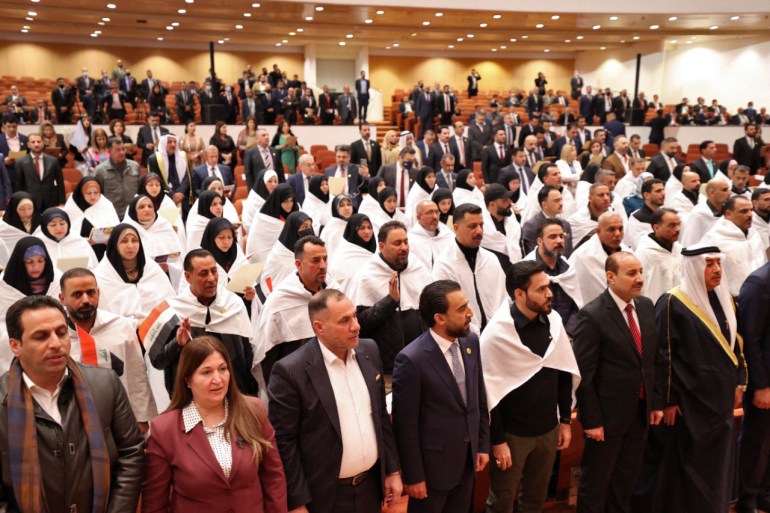Chaotic scenes as Iraq’s new parliament holds first session | Politics News
Iraq’s new parliament has re-elected its speaker for a second term, the first step towards forming a new government after a general election whose results have been contested by powerful Iran-backed factions.
In a reflection of the tensions, the new parliament’s first session on Sunday was marked by disarray, with the eldest member, Mahmoud al-Mashhadani, being evacuated to the hospital after falling ill.
The chaotic meeting ushers in what is likely to be a lengthy period of political wrangling among rival groups to choose a new president and a prime minister. As the leader of the biggest bloc, Shia leader Moqtada al-Sadr has the upper hand in forming a new government. But he will have to manage tensions with rival Shia groups that continue to reject the election results and are demanding to have a say in the government formation process.
According to Iraq’s constitution, the largest bloc in parliament has the right to choose the new prime minister.
But as the meeting got under way on Sunday, a coalition known as the Shia Coordination Framework, an alliance of Shia factions which object to the vote results, submitted a list of lawmakers’ names it claimed now hold the biggest parliamentary bloc with 88 seats, rather than al-Sadr.
Chaos erupted briefly in the chamber, during which legislators crowded around al-Mashhadani, who was leading the session.
Within minutes, the 73-year-old legislator was carried out of the room by security forces and bundled in an ambulance that took him to hospital, where he was visited by some of the heads of political and militia factions. He appeared to be in good condition, according to people who later saw him there.
Following the disruption, the parliament session resumed, although the issue of the majority was not immediately resolved.
Later, 200 legislators picked incumbent Speaker Mohamed al-Halbousi for a second term, while 14 voted for al-Mashhadani.
Al-Halbousi, whose Sunni party came in second with 37 seats, is the former governor of Anbar province and was supported by al-Sadr, Kurdish and Sunni groups.
By custom, Iraq’s parliamentary speaker is a Sunni, the prime minister is a Shia and the president a Kurd.
Parliament has 30 days from the first session to elect the country’s new president, who will then ask the largest bloc in parliament to form a government.
Intra-Shia disagreement
Pro-Iranian groups suffered significant losses in the early elections, which were brought forward in response to months-long street protests calling for reforms.
The results sparked street protests from supporters of the political parties which fared poorly in the parliamentary polls.
Last month, the Iraqi federal court approved the results of the October election and confirmed the victory of al-Sadr.
Al-Sadr’s bloc secured 73 seats in the 329-strong parliament, according to the final results.
Pro-Iran factions that alleged voter fraud lost about two-thirds of their seats – a significant blow.
Supporters of armed groups pitched tents and staged a sit-in around the capital’s so-called Green Zone, which houses the Iraqi government and many foreign diplomatic missions, for more than two months, while they appealed at Iraq’s top court.
Zeidon Alkinani, an Iraqi political analyst, said the major obstacle to forming a government is the intra-Shia disagreement caused by the rift between al-Sadr and the Shia Coordination Framework consisting of pro-Iran groups such as former Prime Minister Nouri al-Maliki’s State of Law, the Fatah alliance and their allies.
“The Sadrist movement is trying to create a majority government this time,” Alkinani told Al Jazeera.
“They believe they have the electoral confidence and power this time to create a majority government they would lead – a government that they would unilaterally dominate as the only political Shia player in such a majority government with their Kurdish and Sunni partners.”
On the other hand, he added, “the Shia Coordination Framework is using their influences within and beyond the government to ensure that a consensus government would include them, despite their electoral defeat”.
“The only clear agreement that we are witnessing right now is the agreement within the Sunni bloc that is mostly dominated by Taqdum,” he added.
 Iraq’s new parliament held its inaugural session three months after legislative elections as Shia leader Moqtada al-Sadr is the likely kingmaker of the next government [Iraqi Prime Minister’s Press Office/AFP]
Iraq’s new parliament held its inaugural session three months after legislative elections as Shia leader Moqtada al-Sadr is the likely kingmaker of the next government [Iraqi Prime Minister’s Press Office/AFP]On Sunday, parliamentarians from al-Sadr’s bloc walked into the assembly in the capital Baghdad wearing white sashes symbolising death shrouds, following the tradition of Mohammed al-Sadr, the late father of Moqtada, witnesses said.
Some independent legislators, meanwhile, reached the assembly riding tuk-tuks, or motorised rickshaws, from Baghdad’s Tahrir Square, the epicentre of anti-government protests that erupted in October 2019, the witnesses added.
Tuk-tuks were used to transport the injured during the violent demonstrations.
